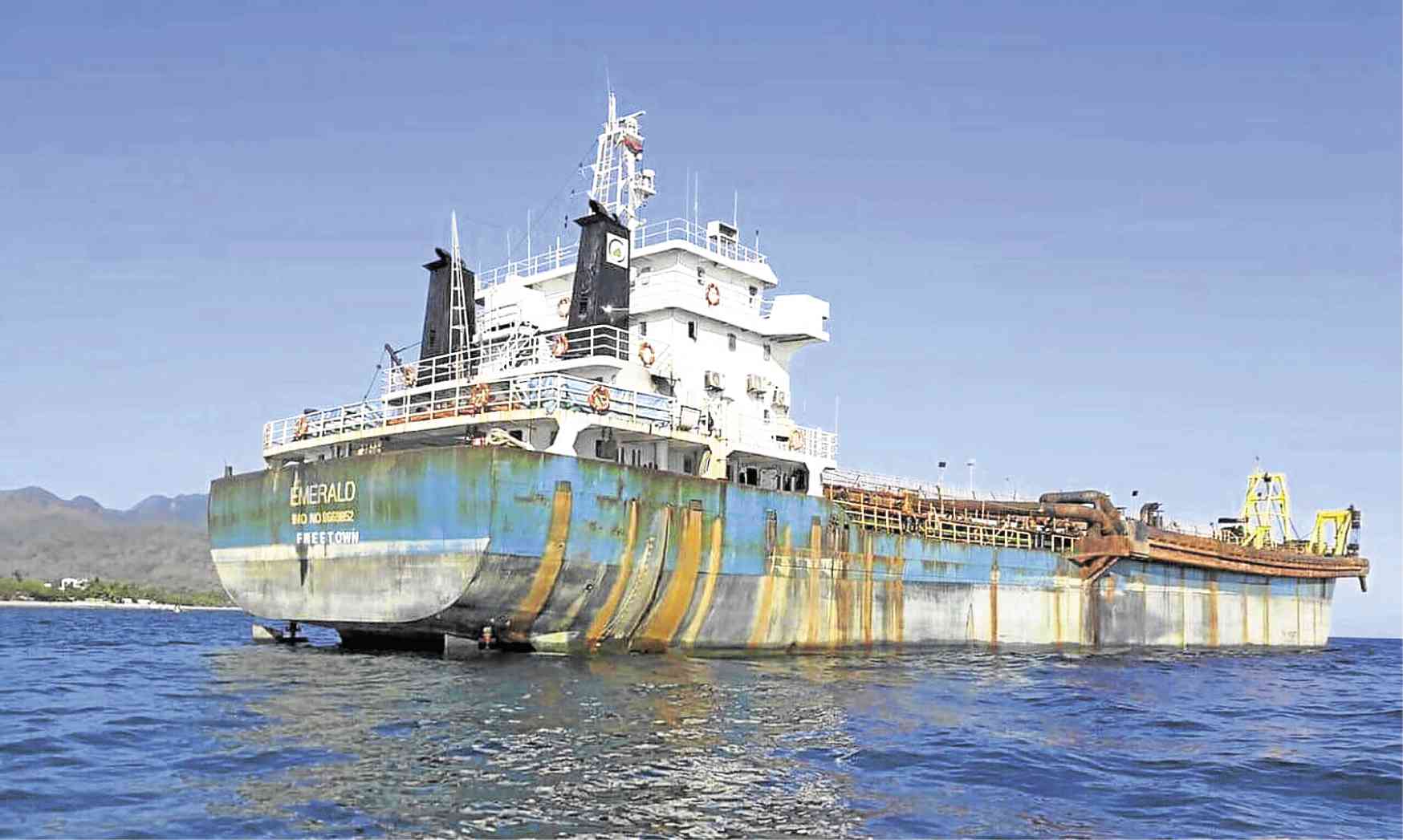Esperon has final say on Chinese-crewed dredging ship

PHOTO COURTESY OF BATANGAS POLICE MARITIME GROUP
President Duterte’s national security adviser, Hermogenes Esperon Jr., on Thursday said he would be responsible for giving the final approval for the operation of a foreign dredging ship brought into the country by a Filipino company to desilt a river in Batangas province.
Leo Campos, CEO of Seagate Engineering and Buildsystems, said documents on the dredging project had been sent to the National Security Council (NSC), the government agency that gives clearance to any foreign ship that operates in Philippine waters.
The Calabarzon regional office of the Environmental Management Bureau on Wednesday suspended Seagate’s three environmental compliance certificates (ECC) issued in May and June last year on orders from Secretary Roy Cimatu of the Department of Environment and Natural Resources.
No other permits
Officials said the ECCs were suspended because the company had failed to secure permits and clearances from at least 16 other agencies that were required after it received the ECC in October 2018.
Article continues after this advertisementCampos earlier expressed confidence they could start dredging the Lobo River “as soon as we obtain the final permit from the NSC” using the the Chinese-manned MV Emerald, a 2,990-ton hopper dredger, which sailed into Lobo town’s waters on Thursday last week.
Article continues after this advertisementEsperon, who heads the secretariat of the NSC, which is chaired by the President, did not give a categorical answer when the Inquirer asked him whether he would approve Seagate’s request for a permit. Instead, he explained the process for getting it.
He said Seagate’s application was now with the Maritime Industry Authority, which would consult with other agencies.
‘No contract, no NSC permit’
“Then it goes to the National Coast Watch Center,” he said. “If [Seagate] has no contract with a local/domestic company or agency, then I can’t give any permit.”
Esperon last year issued guidelines for securing clearance for foreign-registered vessels after the President directed the Cabinet “to ensure the integrity and security of Philippine borders and to oversee the grant of permits for foreign survey vessels to enter Philippine waters.”
A Philippine National Police memorandum to its regional directors on Aug. 20, 2018, explained that the NSC guidelines were intended to take into consideration “the national security of the country’s maritime domain and the ensuring of compliance with relevant Philippine laws, rules and regulations and international laws and conventions” by foreign vessels.
Export permit denied
The regional Mines and Geosciences Bureau (MGB) in February denied Seagate’s request for a permit for mineral ore export, operation and transport because the “source of mineral is not covered by any mining permit.”
“We may have overlooked [some requirements] but we are willing to appeal (the suspension by) complying with these,” Campos told the Inquirer on Thursday.
Environment Undersecretary Benny Antiporda on Thursday said Seagate could not dredge the Lobo River until it had the required DENR permits.
“If they have a special arrangement with the NSC, that’s their business,” he said. “But since the kind of project they [will do] deals with the Department of Environment and Natural Resources, then that’s our business.”
DENR regional director Maria Paz Luna said that even if Seagate secured an NSC permit, the company still needed to comply with the requirements of the other agencies before it begins its operation.
“It’s not that (one) supersedes the other because (the permits) are different,” she told the Inquirer.
Campos earlier said Seagate could not be covered by mining laws since it was involved in dredging “and not mining or quarrying.”
“That’s a hell of an interpretation,” Luna said in response. She said sand was still considered a mineral ore and its transport would require a permit from the MGB.
MGB permit crucial
Campos said his company would appeal the ECC suspension, but Luna said that if Seagate could not obtain an export permit from the MGB and it could not submit other requirements, the suspension would not be lifted.
Asked whether an NSC clearance could supersede the other requirements, she said the MGB permit was “the most important.”
“They applied (for an export permit) meaning they know they need it,” she said, adding that the company also needed a dredging permit from the DPWH. “Each of those (permits) are different requirements and ECC is hinged on compliance with others.”
The Emerald caused alarm among residents of the fishing village of Lagadlarin and Lobo town officials last week when it sailed into its waters unannounced and dropped anchor just 500 meters from a 30-hectare mangrove reserve, which is part of the Verde Island Passage, a marine sanctuary.
A 2008 memorandum of agreement between Seagate and the Lobo municipal government allowed the company to dredge up to 2 million cubic meters of sand from a 6.5-kilometer stretch of the Lobo River at no cost to the town.
Seagate was to sell the sand for $2 per metric ton to Synergy Plus Holdings Ltd. for the reclamation and construction of the Hong Kong International Airport Three Runway System.
P300 million to P434 million
Based on worldwide conversion standards followed by the DPWH, 2 million cubic meters of wet packed sand would be equivalent to 4.16 million metric tons, which could be worth $8.33 million, or P434.4 million, for Seagate. The same volume of dry loose sand would be worth $5.7 million, or P300.9 million.
Campos told the Inquirer his company would be made to pay a 4-percent excise imposed by the Department of Finance, the local tax set by local ordinances, and P12 per cubic meter of sand or silt to be divided among the local government (which will get 30 percent), the provincial government (30 percent) and the village (40 percent). —WITH REPORTS FROM JHESSET O. ENANO AND INQUIRER RESEARCH